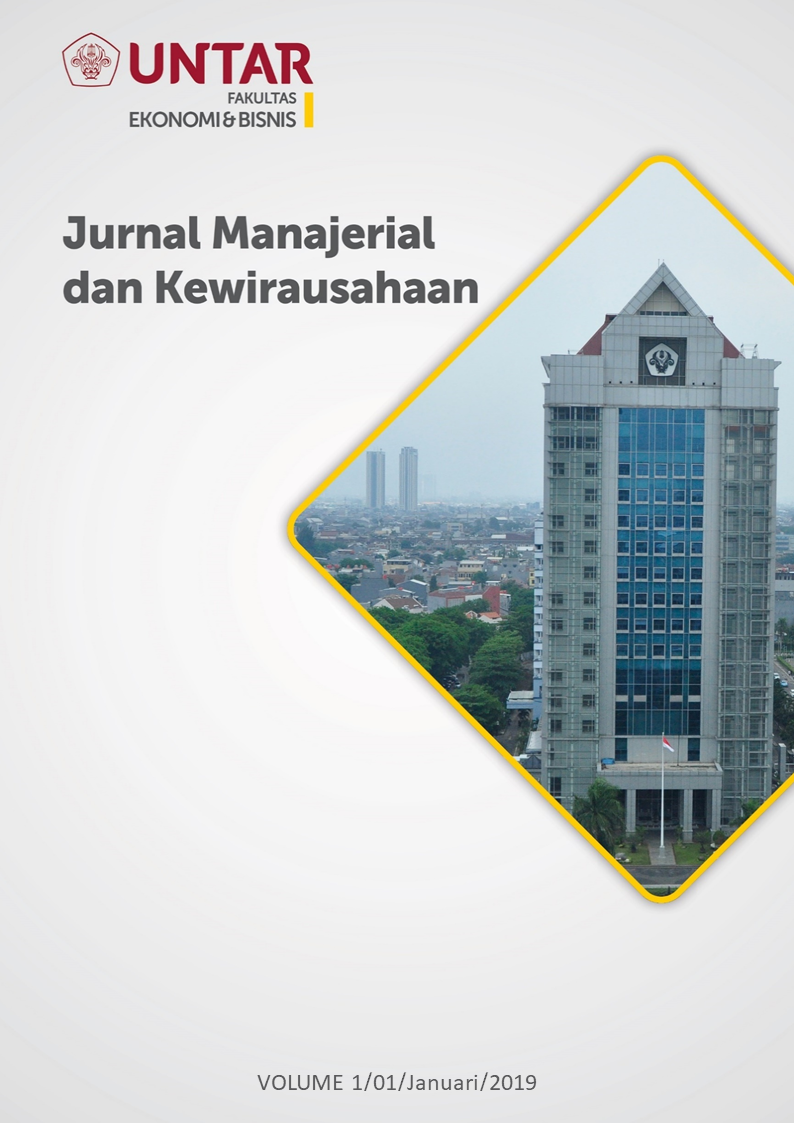Pengaruh Pengetahuan Keuangan, Lokus Pengendalian Dan Pendapatan Terhadap Perilaku Keuangan
Main Article Content
Abstract
The purpose of this research is to analyze the influence of Financial Knowledge, Locus of Control, and Income on Financial Behavior. The population of this research are lecturers teaching at the University located in West Jakarta who are active in teaching as well as who are continuing their further education. Sample was selected using convenience sampling method amounted to 169 respondents. Data processing techniques using structural equation modeling what helped by SmartPLS.3.2.7 program. The result of this study reveals that Financial Knowledge and Locus of Control do affect significantly on Financial Behavior, while Income does not affect significantly on Financial Behavior.
Tujuan penelitian ini adalah untuk menganalisis pengaruh Financial Knowledge, Locus of Control, dan Income terhadap Financial Behavior. Populasi penelitian ini adalah dosen yang mengajar di Universitas yang berlokasi di Jakarta Barat baik yang aktif mengajar maupun yang sedang melanjutkan studi pendidikan lanjutan. Sampel dipilih menggunakan metode convenience sampling sebanyak 169 responden. Teknik pengolahan data menggunakan structural equation modeling yang dibantu oleh program SmartPLS.3.2.7. Hasil penelitian ini menunjukkan bahwa Financial Knowledge dan Locus of Control berpengaruh secara signifikan terhadap Financial Behavior, sedangkan Income tidak berpengaruh secara signifikan terhadap Financial Behavior.
Article Details
Section
This work is licensed under a Jurnal Muara Ilmu Ekonomi dan Bisnis Creative Commons Attribution-ShareAlike 4.0 International License.,/p>
References
Aizcorbe, A. M., Kennickell, A. B., & Moore, K. B. (2003). Recent Changes in U.S.
Family Finances: Evidence from the 1998 and 2001 Survey of Consumer Finances.
Federal Reserve Bulletin , 86, 1-32.
April, K. A., Dharani, B., & Peters, K. (2012). Impact of Locus of Control Expectancy on
Level of Well-Being. Review of European Studies , 4 (2), 124-137.
Arifin, A. Z. (2017). The Influence of Financial Knowledge, Control and Income on Individual
Financial Behavior. European Research Studies Journal , XX (3A), 635-648.
Barker, R. (2010). On the Definitions of Income, Expenses and Profit in IFRS. Accounting in
Europe , 7 (2), 147-158.
Bowen, C. F. (2002). Financial Knowledge of Teens and Their Parents. Financial
Counseling and Planning , 13 (2), 93-102.
Britt, S., Cumbie, J. A., & Bell, M. M. (2013). The Influence of Locus of Control on
Student Financial Behavior. College Student Journal , 178-184.
Chin, W. W. (1998). The Partial Least Squares Approach to Structural Equation Modeling.
Modern Methods for Business Research , 295-336.
Garman, E. T., & Forgue, R. E. (2006). Personal Finance (8th ed.). Boston: Houghton
Mifflin Company.
Garman, E. T., & Forgue, R. E. (2000). Personal Finances (6th ed.). Boston: Houghton Mifflin
Company.
Grable, J. E., Park, J.-Y., & Joo, S.-H. (2009). Explaining Financial Management Behavior
for Koreans Living in the United States. The Journal of Consumer Affairs , 43 (1), 80-107.
Hair, J. F., Ringle, C. M., & Sarstedt, M. (2011). PLS-SEM: Indeed a Silver Bullet. Journal
of Marketing Theory & Practice , 19 (2), 139-151.
Henseler, J., Ringle, C. M., & Sinkovics, R. R. (2009). The Use of Partial Least Squares Path
Modeling in International Marketing. Advances in International Marketing , 20, 277-319.
Herd, P., Holden, K., & Su, Y. T. (2012). The Links between Early-Life Cognition and
Schooling and Late-Life Financial Knowledge. The Journal of Consumer Affairs , 46 (3),
-435.
Hilgert, M. A., Hogarth, J. M., & Beverly, S. G. (2003). Household Financial Management:
The Connection between Knowledge and Behavior. Federal Reserve Bulletin , 89 (7),
-322.
Hogarth, J. M., & Hilgert, M. A. (2002). Financial Knowledge, Experience and Learning
Preferences: Preliminary Results from a New Survey on Financial Literacy.
Consumer Interest Annual , 48, 1-7.
Horne, J. C., & Wachowicz, J. M. (2009). Fundamentals of Financial Management (13th ed.).
Harlow: Financial Times Prentice Hall.
Huang, J., Nam, Y., & Sherraden, M. S. (2013). Financial Knowledge and Child Development
Account Policy: A Test of Financial Capability. The Journal of Consumer Affairs , 47
(1), 1-26.
Ida, & Dwinta, C. Y. (2010). Pengaruh Locus of Control, Financial Knowledge, Income
terhadap Financial Management Behavior. Jurnal Bisnis dan Akuntansi , 12 (3), 131-144.
Idris, F. H., Krishnan, K. S., & Azmi, N. (2013). Relationship Between Financial Literacy and
Financial Distress Among Youth in Malaysia - An Empirical Study. Malaysia Journal of
Society and Space , 9 (4), 106-117.
Joo, S. (2008). Personal Financial Wellness. In J. J. Xiao, Handbook of Consumer
Finance Research. New York: Springer , 21-33.
Kholilah, N. A., & Iramani, R. (2013). Studi Financial Management Behavior pada
Masyarakat Surabaya. Journal of Business and Banking , 3 (1), 69-80.
Lee, H.-W. (2013). Locus of Control, Socialization, and Organizational Identifiaction.
Management Decision , 51 (5), 1047-1055.
Perry, V. G., & Morris, M. D. (2005). Who Is in Control? The Role of Self-Perception,
Knowledge, and Income in Explaining Consumer Financial Behavior. The Journal
of Consumer Affairs , 39 (2), 299-313.
Robbins, S. P., & Judge, T. A. (2008). Perilaku Organisasi Edisi ke-12. Jakarta: Salemba Empat.
Xiao, J. J., & Dew, J. (2011). The Financial Management Behavior Scale: Development
and Validation. Journal of Financial Counseling and Planning , 22 (1), 43-59.

